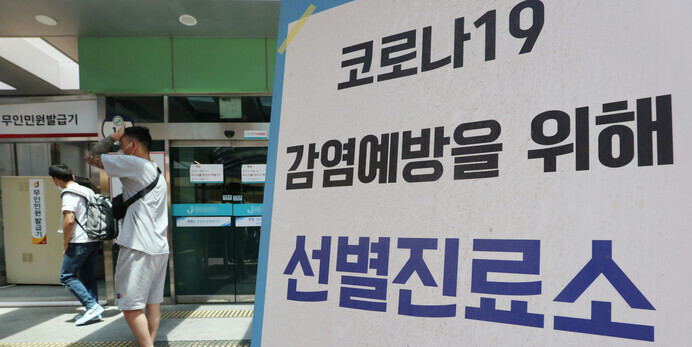hankyoreh
Links to other country sites 다른 나라 사이트 링크
3 factors that will determine if COVID-19 resurges in S. Korea this summer

After consistently declining since mid-March, South Korea’s weekly average of new confirmed COVID-19 cases showed an increase for the first time in 15 weeks.
As South Korea approaches its first summer vacation season without social distancing measures since the start of the pandemic, the administration of President Yoon Suk-yeol appears likely to face the first test of its disease prevention capabilities amid three major variables: the spread of a new Omicron subvariants of the virus, waning post-vaccines and post-infection immunity, and limited disease control and healthcare response measures.
Average weekly new cases show first uptick in 15 weeksOn Sunday, the Central Disease Control Headquarters of the Korea Disease Control and Prevention Agency announced that a total of 10,059 new confirmed COVID-19 cases had been counted as of the end of the previous day, including 9,868 domestic cases and 191 cases among travelers arriving from overseas.
It was the third time in the past week that new confirmed cases topped 10,000. The daily average for June 25–July 2 stood at 8,549.1 new cases — up by nearly 1,500 (21%) from 7,053.9 for the week immediately preceding.
This marked the first rise in the weekly average of new confirmed cases in 15 weeks. The indicator had been steadily declining since the week of March 13–19.
The basic reproduction number (R0), indicating the number of additional infections per patient, stood at 1.0 as of Tuesday. According to a COVID-19 mathematical modeling analysis drafted Wednesday by the research team of Konkuk University mathematics professor Jung Eun-ok, an R0 of 1.01 was predicted to lead to a daily average of 7,674 new cases in two weeks and 10,144 in four weeks.
BA.5 Omicron subvariant spreadsAn examination of domestic detection rates for major viral variants during the fourth week of June (June 19–25) showed the percentage of cases involving BA.5 — a subvariant of Omicron — rising from 2.0% to 7.5% in the space of a week.
The rate of BA.5 cases was also observed rising steeply from 28% to 43% in a World Health Organization analysis of genomic sequences reported between June 6 and 19.
While no evidence has been reported to indicate that BA.5 poses a greater risk of severe symptoms than the established BA.1 Omicron variant, cases have been rising rapidly. A report published by the UK Health Security Agency on June 24 showed BA.5 with the fastest rate of increase among subvariants, followed by BA.4 and BA.2 (the so-called “stealth omicron” subvariant).
Waning immunity from vaccines and infectionsThe immunity gained from vaccines and natural infection with COVID-19 are believed to last for between three and six months. The effects of a third vaccine dose in particular are estimated to begin waning at around four months post-inoculation.
As of late February, 61% of South Korea’s total population had received a third dose of a COVID-19 vaccine. This means that as of July, the effects of that third dose may start declining for over 6 out of 10 people.
In late June, 35.1% of South Koreans aged 60 and over — considered a high-risk group — had received a fourth vaccine dose. This suggests the possibility that severe symptoms and deaths may increase among seniors in the event of a resurgence.
Most of those infected during South Korea’s fifth wave were diagnosed between Jan. 30 and mid-March. Those who acquired natural immunity in March could also become reinfected beginning in July.
Limited disease control and healthcare responseEarly this month, the Yoon administration plans to draw up response policies for a pandemic resurgence based on advice from the national infectious disease crisis response advisory committee, a group of non-government experts affiliated with the prime minister’s office.
By Lim Jae-hee, staff reporter
Please direct questions or comments to [english@hani.co.kr]

Editorial・opinion
![[Editorial] Korea must respond firmly to Japan’s attempt to usurp Line [Editorial] Korea must respond firmly to Japan’s attempt to usurp Line](https://flexible.img.hani.co.kr/flexible/normal/500/300/imgdb/original/2024/0514/2317156736305813.jpg) [Editorial] Korea must respond firmly to Japan’s attempt to usurp Line
[Editorial] Korea must respond firmly to Japan’s attempt to usurp Line![[Editorial] Transfers of prosecutors investigating Korea’s first lady send chilling message [Editorial] Transfers of prosecutors investigating Korea’s first lady send chilling message](https://flexible.img.hani.co.kr/flexible/normal/500/300/imgdb/original/2024/0514/7917156741888668.jpg) [Editorial] Transfers of prosecutors investigating Korea’s first lady send chilling message
[Editorial] Transfers of prosecutors investigating Korea’s first lady send chilling message- [Column] Will Seoul’s ties with Moscow really recover on their own?
- [Column] Samsung’s ‘lost decade’ and Lee Jae-yong’s mismatched chopsticks
- [Correspondent’s column] The real reason the US is worried about Chinese ‘overcapacity’
- [Editorial] Yoon’s gesture at communication only highlights his reluctance to change
- [Editorial] Perilous stakes of Trump’s rhetoric around US troop pullout from Korea
- [Guest essay] Preventing Korean Peninsula from becoming front line of new cold war
- [Column] The state is back — but is it in business?
- [Column] Life on our Trisolaris
Most viewed articles
- 1[Editorial] Transfers of prosecutors investigating Korea’s first lady send chilling message
- 2Korea cedes No. 1 spot in overall shipbuilding competitiveness to China
- 3Major personnel shuffle reassigns prosecutors leading investigations into Korea’s first lady
- 4Korean opposition decries Line affair as price of Yoon’s ‘degrading’ diplomacy toward Japan
- 5Second suspect nabbed for gruesome murder of Korean in Thailand, 1 remains at large
- 6[Column] Will Seoul’s ties with Moscow really recover on their own?
- 7[Photo] Korean students protest US complicity in Israel’s war outside US Embassy
- 8US has always pulled troops from Korea unilaterally — is Yoon prepared for it to happen again?
- 9[Editorial] Korea must respond firmly to Japan’s attempt to usurp Line
- 10[Correspondent’s column] The real reason the US is worried about Chinese ‘overcapacity’